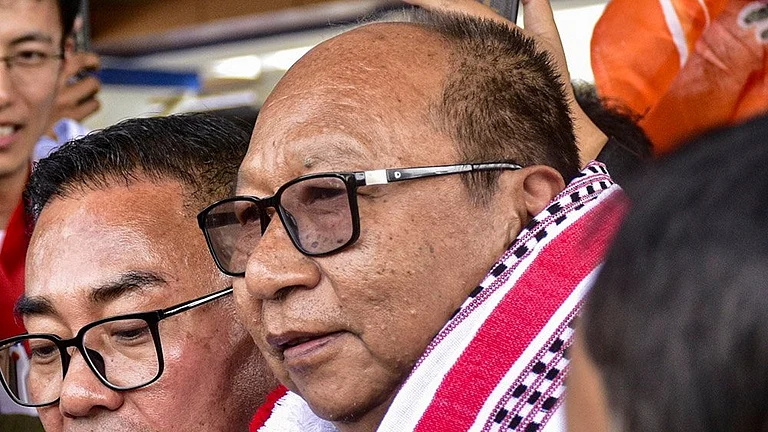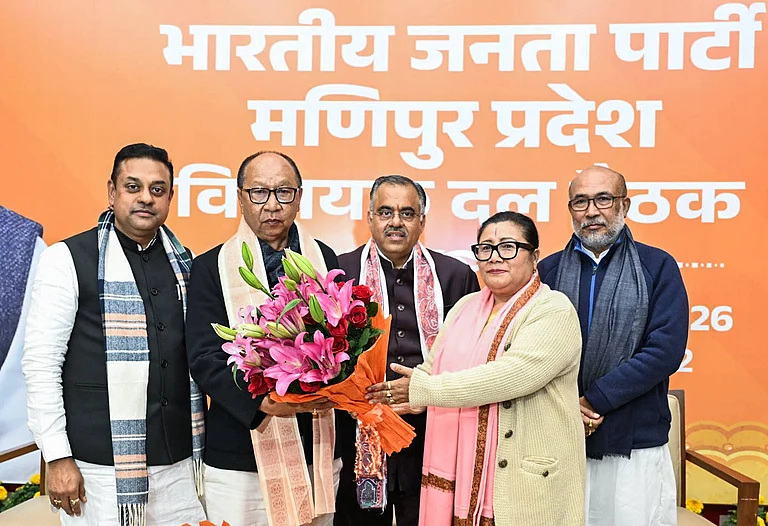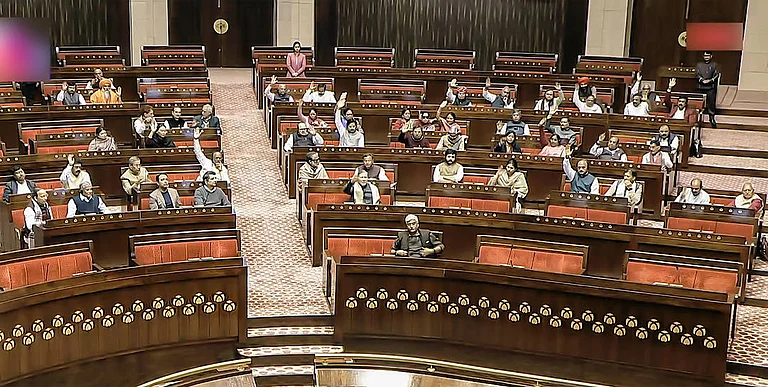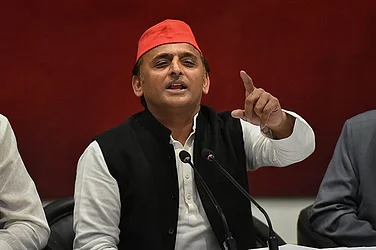52-year-old Riatto Kakho was a man of respect in Old Kolagaon village of Tirap district, Arunachal Pradesh. He was the ‘Minister’ of a tribal kingdom, claims Meje Taku, a local student leader. On March 20, Kakho was shot dead by security forces in what the Assam Rifles claimed was a gun battle with NSCN (IM) rebels.
According to Taku, a student leader of the All Arunachal Pradesh Students’ Union (AAPSU), Kakho was in the wrong place at the wrong time.
On the fateful day, three cadres of the NSCN-IM came down from Namsa of Mon district in Nagaland via Deomali and demanded Kakho and another villager, Pakngam Lowang, to escort them towards the boundary of Changlang district bordering Tirap, as per reports.
However, security forces intercepted their movement inside a jungle, which led to a gun fight.
“When bullets were exchanged, Riatto and Lowang lay on the ground. Still, a bullet hit Riatto. Lowang screamed at the security forces saying they were civilians,” said Tao Meje.
While Riatto died on the spot, Lowang is still admitted in a hospital in neighbouring Assam.
The incident immediately reminded everyone of December 4, when in Oting village of Mon district, Nagaland – the main operating ground of NSCN (IM) – special forces of Indian Army killed as many as 13 villagers on suspicion of being militants. Following the incident, the Northeastern states erupted in massive protests against the controversial Armed Forces (Special Powers) Act (AFSPA), which has been in place in many parts of the region for the past 64 years. But the protest had a quicker death than expected.
The Oting massacre drew much attention of powerful politicians like Meghalaya's Conrad Sangma, the National People’s Party chief, even though AFSPA was removed from Meghalaya in 2018.
At that time assembly polls were only three months away in Manipur – another state with AFSPA in place (except municipal areas of capital city Imphal) – and its politics is greatly impacted by AFSPA in its Naga-dominated areas.
A Nagaland-based party, Naga People’s Front (NPF), also held massive protests demanding repealing of the act.
Two weeks later when AFSPA was further extended for six months in Nagaland, the NPF had said, “This extension is a manifestation of the utter disregard of the central government for small states, particularly in Northeast India.”
The NPF is a partner in the all-party government of Nagaland, in which BJP is also a partner. It is BJP’s favourite regional partner in Manipur as well. The NPF in its election manifesto had stated that repealing AFSPA would be one of its main tasks if it came to power.
Repealing AFSPA was one of the key campaign issues of the party, which gained three more seats in Naga tribe-dominated hill areas of Manipur in the recently concluded polls, taking its tally from four seats in 2017 to seven.
However, big brother BJP did not promise anything remotely related to AFSPA, either in its manifesto or in its poll campaigns.
Talking to Outlook, Thowo Kyapumai, an NPF leader from Senapati district of Manipur, said, “We support BJP but we don’t support AFSPA. Now that one of our MLAs is part of the Manipur cabinet, we hope our demand for its repeal will be heard by Parliament more sincerely.”
Upon being asked how NPF expects BJP to take initiatives for repealing of the act when it is not in their election manifesto, he said, “We know there is nothing on repealing AFSPA in BJP’s manifesto. But we are hoping the government will try to meet our demands. Now look at Congress. Repealing of AFSPA was always in their manifesto. Despite being in power for such a long time in the state, it did nothing."
In Manipur alone, pleas for justice related to over 1,500 extra-judicial killings or fake encounters committed between 1980 and 2011 have remained pending.
Talking to Outlook, Suhas Chakma, a New Delhi-based rights activist and director of the Rights and Risks Analysis Group, said, “If Naxalite violence can be dealt by police, there is no reason why insurgency in the Northeast can't also be handled by cops."
Chakma feels while the demand for repealing AFSPA is consistent, it dies a natural death because of lack of response from governments. According to him, political parties are not at all serious about the issue of AFSPA.
Chakma was right while saying so because two chief ministers, Conrad Sangma of Meghalaya and Neiphiu Rio of Nagaland, both of whom have BJP as partner in their respective governments, have gone silent on the issue since the Manipur polls.
Echoing the tone of Chakma, Kenbom Bagra, General Secretary of International Human Rights Commission’s Arunachal Pradesh Chapter said, “Our leaders are not committed. They are materialistic and power hungry. They can compromise everything for election victory. In Arunachal Pradesh, I don’t see successful democratic system. There is corruption and bias in everything.”
Conrad Sangma these days looks to be busy trying to save his nose in Manipur by convincing the state BJP leadership to embrace his NPP as a partner in government, while the latter has time and again expressed its unwillingness to keep any party other than NPF with it. If NPP became a partner, Sangma is not going to renew his demand of repealing AFSPA anytime soon, on which the BJP seems least bothered and which might increase the already prevailing discomfort between the two. If NPP sits in the Opposition, it would also be difficult for them to raise a strong voice against a majority-led government like Manipur BJP.
Same goes with Naga People’s Front – BJP’s only regional partner in Manipur so far. Its senior most leader, T R Zeliang, had termed AFSPA “a license to kill”.
“Under AFSPA, any crime committed by armed forces is given complete impunity. So far, according to reliable reports, more than 20,000 innocent lives in Northeast India have been lost, besides incidents of rape, arrest, torture and extra-judicial execution,” said T.R.Zeliang during the 10th session of the 13th Nagaland Legislative Assembly after the Oting massacre.
The fact that even without NPF, BJP has a majority of its own, does not go in favour of NPF in Manipur. Riding on the sentiments of the Oting massacre, the NPF made repealing of AFSPA as its poll promise, but how to go about repealing the act depends upon the BJP.
Dhiren A Sadokpam, editor of Frontier Manipur and a political analyst, said, “Meghalaya CM Conrad Sangma and Nagaland CM Neiphiu Rio would not be able to create the required push to convince the Centre on the issue. Not only them, but none of the BJP-led coalition governments in Northeastern states have managed to swing any opinion in favour of repealing AFSPA, nor do they have the political clout to do so. At the most, these governments can revoke the Disturbed Areas Act from identified areas.”
In fact, since 1958, no political party in India and the Northeast has been able to successfully rally around anti-AFSPA movements for its total repeal. While the intent of all parties that promised to take forward the movement for the Act's repeal seems to be clear, like in the case of NPP or NDPP, no ruling dispensation in India has honestly addressed the issue.
Sadokpam feels New Delhi's approach has always been constrained by national security questions.
“Their (regional party’s) promises to the people will be eventually silenced by BJP's overarching polemics on national security and associated arguments on reining in armed political movements. So there is little that these parties can do, even if their intent is clear,” Sadokpam said.
States like Manipur had witnessed massive stirs in the aftermath of the alleged rape and murder of Manorama in July 2004. Despite consistent efforts, the government of India refused to repeal the Act. The closest sympathy Northeast states like Manipur got from the Centre was when former Prime Minister Manmohan Singh said the government was considering amendments to AFPSA to make it "humane".


























